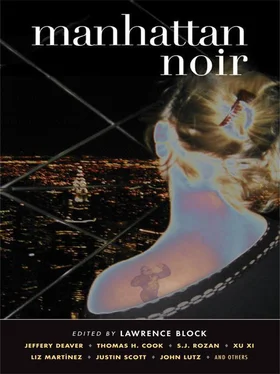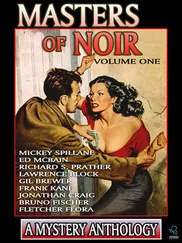Lawrence Block - Manhattan Noir
Здесь есть возможность читать онлайн «Lawrence Block - Manhattan Noir» весь текст электронной книги совершенно бесплатно (целиком полную версию без сокращений). В некоторых случаях можно слушать аудио, скачать через торрент в формате fb2 и присутствует краткое содержание. Жанр: Триллер, на английском языке. Описание произведения, (предисловие) а так же отзывы посетителей доступны на портале библиотеки ЛибКат.
- Название:Manhattan Noir
- Автор:
- Жанр:
- Год:неизвестен
- ISBN:нет данных
- Рейтинг книги:3 / 5. Голосов: 1
-
Избранное:Добавить в избранное
- Отзывы:
-
Ваша оценка:
- 60
- 1
- 2
- 3
- 4
- 5
Manhattan Noir: краткое содержание, описание и аннотация
Предлагаем к чтению аннотацию, описание, краткое содержание или предисловие (зависит от того, что написал сам автор книги «Manhattan Noir»). Если вы не нашли необходимую информацию о книге — напишите в комментариях, мы постараемся отыскать её.
Manhattan Noir — читать онлайн бесплатно полную книгу (весь текст) целиком
Ниже представлен текст книги, разбитый по страницам. Система сохранения места последней прочитанной страницы, позволяет с удобством читать онлайн бесплатно книгу «Manhattan Noir», без необходимости каждый раз заново искать на чём Вы остановились. Поставьте закладку, и сможете в любой момент перейти на страницу, на которой закончили чтение.
Интервал:
Закладка:
Wait a minute, where was down there? Where was I?
I looked around. The street appeared the same as it had moments before, except that I was seeing it from above. Holy Christ, was I dead?
Freddie appeared. “How you doin’? You all right?”
“All right? I think I’m dead.”
“Yeah, pretty much,” he said and looked down. Paramedics were covering the dead cop-me-with a white sheet.
“Why’d you warn me against shooting?” I asked him. Then I realized that I didn’t have to ask. I knew without his telling me that he was just doing his job as my guardian angel.
Then I knew something else. I wasn’t supposed to be dead. Freddie had screwed it up.
“Yeah,” he said, acknowledging my newfound understanding. “What did you expect?”
I thought about it. I really had no one to blame but myself for being dead. After all, what could I expect with Freddie Prinze as my guardian angel?
THE ORGAN GRINDERBY MAAN MEYERS
Lower East Side
Antonio Cerasani rolled the mobile contraption over the broken cobble where Broome Street met Jefferson. The barrel organ had two wheels and handled like a pushcart. Every part of it gleamed in the bright sunshine. Even the country scene painted on its side seemed to glow with its own light.
He settled the cart as close to the curb as possible in the least of the refuse that layered the streets. With the cart in place, he began to crank the organ. Music poured from the barrel with sweet abundance, almost blocking out the other sounds: babes howling, the scraping of thick shoes on the asphalt pavement, metal-clad hooves and wheels clamoring on the cobblestones, passersby in screaming conversations.
The cacophony of everyday life. But here the very intensity of it was an abomination.
Indifferent to the heat of the day, Tony wore heavy trousers, a vest, and a long brown coat. His shabby, dark brown hat sat atop his black hair. An enormous mustache hid his mouth. Only a wisp of smoke from the stub of the twisted black cigar gave any indication of where it was.
The bitter tang of the cigar almost wiped away the stench of horse shit. Almost. The organ grinder hated the smell from when he was a boy in Palermo and had to sleep in the stable of his father’s padrone. New York was like a giant stable full of horse dung, particularly in this neighborhood where the White Wings, the street sweeping brigade, seldom ventured. Here the streets were ankle deep in dung and garbage, and the air, only barely modified by the briny reek of seaweed from the East River, was putrid with the rot of humanity.
“La Donna e Mobile” rolled from Tony’s machine. He sang in a rich tenor voice. “ Women are fickle, like a feather in the wind. ” And as always, the children on the street laughed and danced haphazardly to the organ grinder’s music.
He searched the tenement windows where once-white sheets stirred languidly in the tepid breeze. Several pennies wrapped in paper dropped from the windows and landed at his feet. The organ grinder, never stopping his music, tipped his hat to his benefactors, collected the coins, and dropped them into his coat pockets.
One lone coin lay just beyond Tony’s stretch, but he did not want to interrupt the flow of music for the moment it would take to claim it, lest he lose further pennies. Tony cranked and Verdi gushed, but no more coins rained down on him.
There came a loud braying, as of animals. Shouting. Blaspheming. Pounding feet. Racing toward the organ grinder were four boys, arms slender as the sticks they carried, their clothes ragged and dirty.
Tony knew these demon boys; they lived on the street. They would steal the nails from the Savior’s cross. He stopped playing. The noise of the streets held sway again. He bent to retrieve the last coin, his coin, when with a cruel twitch of his ass, the largest of the boys bumped Tony, knocking the organ grinder into his organ, setting it trembling, akilter. He grabbed at the cart for balance, but misjudged and sank to his knees in the gutter filth.
Screeching with laughter, Butch Kelly leaned over and scooped up Tony’s errant penny. The runt of the lot, Patsy Hearn, stuck his tongue through his scabby lips and gave the organ grinder a razzberry.
Tony’s hands were in wild motion. His left felt for the coin no longer there, his right worked at steadying the cart.
He struggled to his feet and brushed what offal he could from his trousers. Rage surged, all but suffocating him. He shook his fist at the rampaging youths and damned them, their forms and faces indelible in his mind.
The organ grinder knew that he could not pursue these filthy little devils. If he did, one would surely circle back and steal his organ. He was not so green a horn to let that happen. No. He clamped his teeth tighter on the twisted cigar.
The boys had shown disrespect. Antonio Cerasani from Ciminna, a village on a hill in north-central Sicily, never forgot an insult.
Anyone watching the rude boys would have seen them running along Jefferson down to South Street. Here the East River and the docks stopped their straightaway rush. Nine or ten blocks farther south was the bridge to Brooklyn. It was their playground, all of it.
The four, dressed alike in tattered knickerbockers and vests, their broken shoes wrapped with cloth and cord, ducked past horse carts and drays, shouting to each other, snatching food from pushcarts, brandishing their broomsticks, jabbing, threatening anyone in their path. Frequently they used their sticks to knock a hat from an unsuspecting head.
At South Street, the broken pavement created a channel that cut through the sidewalk and ran into an empty, filth-ridden lot on Jefferson. South Street and the streets leading to it and the harbor were overlaid with a sludge different from elsewhere in the city. This filth bore elements of tar and seawater, for the East River, like its sister the Hudson over to the west, was not truly a river but rather a tidal estuary.
Ships dotted the harbor. The boys could hear the water lapping at the docks, the noise and bustle of the sawmills at the lumberyards. Sawdust smelled sweet amidst the fetid odor of the salt and the tar. Stevedores unloading a ship shouted at one another and cursed the heat.
Butch threw a rock at a seagull resting on a piling and missed. The gull gave a raucous caw, flapped its wings, and flew away. “Shit. Seagulls make good eatin’.”
“They’re tough as an old woman’s ass,” Colin said, gnawing on the remnant of a potato he’d filched on the way.
“Yeah,” Butch shot back, “your ma’s.”
It was Colin who finally broke the stare between them, saying, “Let’s see if we can get some work on the docks.”
Butch Kelly swung his stick. “Too hot to work.” He pointed the stick into the lot. “Run out, Patsy.”
Patsy made an ugly face.
“Run out.”
Patsy Hearn shielded his eyes from the sun as he ran toward the heap of refuse near the back of the lot. Beyond it was some skimpy brush, and amid more garbage, a dying black walnut tree, its trunk slashed by lightning.
“Feckin’ Butch Kelly with his feckin’ games,” Patsy muttered. Forever making Patsy the goat. When they played pitch-and-toss, Butch always cheated, stealing his feckin’ penny. Just like now with the dago’s coin. Butch would pocket the money and never share. And when they played tag or hide-and-go-seek, Patsy was always it. Now this cat-stick game. Here Patsy was in the hot sun, sweating buckets while Butch was swinging his stick, mostly hitting the air, sometimes hitting the pussy, and Tom Reilly and Colin Slattery was up close and catching it. And dumb shit-ass Patsy was out here in the stinking wilderness being cooked by the sun.
Читать дальшеИнтервал:
Закладка:
Похожие книги на «Manhattan Noir»
Представляем Вашему вниманию похожие книги на «Manhattan Noir» списком для выбора. Мы отобрали схожую по названию и смыслу литературу в надежде предоставить читателям больше вариантов отыскать новые, интересные, ещё непрочитанные произведения.
Обсуждение, отзывы о книге «Manhattan Noir» и просто собственные мнения читателей. Оставьте ваши комментарии, напишите, что Вы думаете о произведении, его смысле или главных героях. Укажите что конкретно понравилось, а что нет, и почему Вы так считаете.












